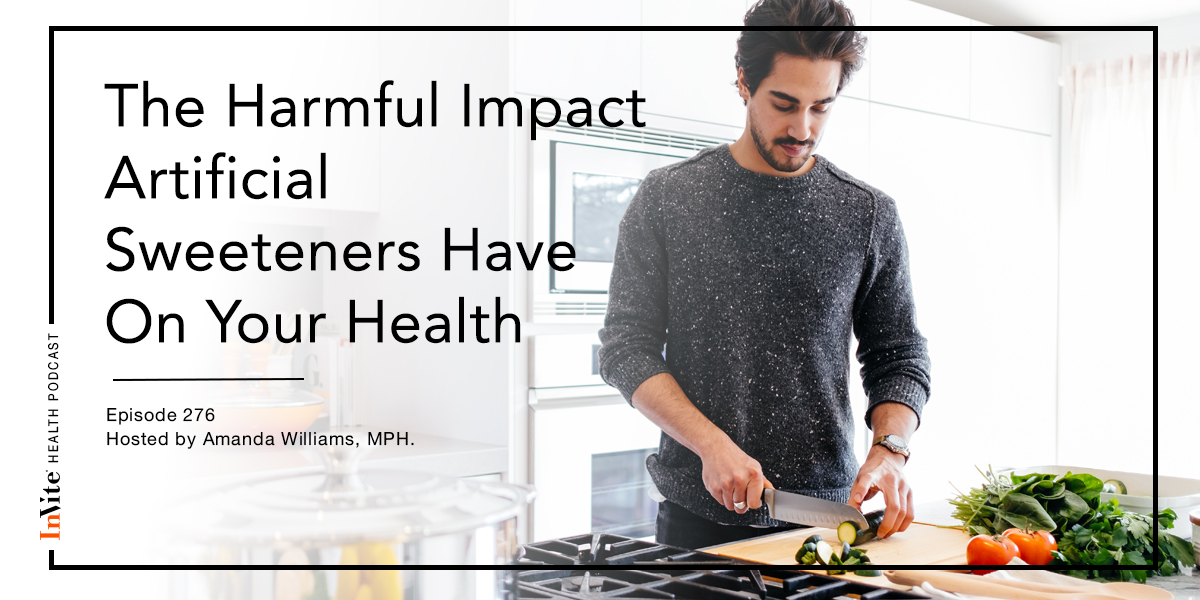The Harmful Impact Artificial Sweeteners Have On Your Health – InVite Health Podcast, Episode 276

artificial sweeteners
Invite Health Podcast, Episode hosted by Amanda Williams, MPH
Subscribe Today!
Back in the day, when artificial sweeteners really hit the market, people were really intrigued by them because they were this really unique alternative to sugar. They were basically adding no calories to your diet, so this was very attractive to many people. They thought these sweeteners must be a good thing because they could eat something very, very sweet without adding calories. But there is a really big catch that we have to know about and that is that artificial sweeteners, as the name implies, are artificial. These sweeteners are widely used in a whole variety of different foods, in particular foods that are contained in the Standard American Diet, including processed foods, powdered drink mixes, soft drinks, dairy products and canned foods. There are so many different places where they sneak in these artificial sweeteners, but yet, they market them as safer and healthier alternatives because they have less calories.†
There is a lot of science that we need to go through so that we can debunk this profound misinformation on artificial sweeteners. They really are quite dangerous for our health.†
HOW CINNAMON AND COROSOLIC ACID SUPPORT HEALTHY BLOOD SUGAR LEVELS – INVITE HEALTH PODCAST, EPISODE 144. Listen Now >>
High fructose corn syrup
Let’s look at high fructose corn syrup as a starting point. High fructose corn syrup was really embraced by this country in the mid-1970s. This is when they started to pump high fructose corn syrup as an alternative sweetener into so many different food products, including soft drinks. To this day, we’re still dealing with the ramifications of high fructose corn syrup, which is a liquid sweetener that is an alternative to table sugar. They were using high fructose corn syrup as opposed to table sugar for economic reasons because it could be mass produced at a much cheaper price.†
One of the points that I like to make about this when we look at the history of high fructose corn syrup in the United States is the direct correlation between when high fructose corn syrup was first introduced into our food supply back in the mid-70s and then in the 1980s, there was this really rapid rise in nonalcoholic fatty liver disease in a pediatric population. That is something that should be alarming to anyone. The prevalence of nonalcoholic fatty liver disease in the pediatric population is estimated to be upwards of 10%, which is absolutely astronomical. This means that these children are damaging their livers before they even become teenagers. This rate also has the potential to be even higher because the rate of pediatric obesity is going up and they estimate that as high as 70 to 80% of those children who are categorized as being obese will also have the comorbid issue of nonalcoholic fatty liver disease.†
Learn more about research on this connection by tuning into the full podcast episode.
Saccharin
Now let’s look at saccharin, which is like Sweet’n Low. When it first came out, they originally put a label on it saying that the FDA and the National Cancer Institute that there is this potential that the saccharin could lead to cancer. They were listing it as a carcinogen, but that’s now all changed. In spite of the fact that there is this mounting clinical and laboratory evidence that point to the dangerous health consequences of these artificial sweeteners, the government has now decided that they are Generally Recognized as Safe (GRAS). That should scare the living daylights out of anyone.†
PROTECT YOUR BODY AGAINST SUGAR-INDUCED DAMAGE WITH BENFOTIAMINE – INVITE HEALTH PODCAST, EPISODE 90. Listen Now >>
What can we do moving forward?
In the face of these dangerous yet prominent artificial sweeteners, we have to know what to do. You have to be aware that the sweet foods that you are taking in should be coming from a natural sweetener. If you want something sweet, it should be coming from eating an apple or having a bowl of blueberries. This is a much better option than the aspartame, high fructose corn syrup, saccharin and sucralose. We know that these things can all create different long-term, long-lasting and incredibly detrimental health effects.†
When we use a true sugar alternative, it should be coming from nature, such as stevia or xylitol, which are directly derived from fruit. Those are the only things that we should be choosing if we’re not using direct sugar. Having fruits and vegetables as opposed to processed foods is one step towards avoiding our exposure to these harmful artificial sweeteners. We have to choose the things that we eat and drink wisely.†
Tune into the full podcast episode for more details on the relationship between artificial sweeteners and insulin resistance, obesity and other harmful health conditions.
Thank you for tuning in to the Invite Health Podcast. You can find all of our episodes for free wherever you listen to podcasts or by visiting www.invitehealth.com/podcast. Make sure you subscribe and leave us a review! Follow us on Facebook, Twitter and Instagram at Invite Health today. We’ll see you next time on another episode of the Invite Health Podcast.
Do you currently use artificial sweeteners in your daily routine? What are some of your favorites? Is this information going to change how you use them? Leave us a comment below to discuss.


